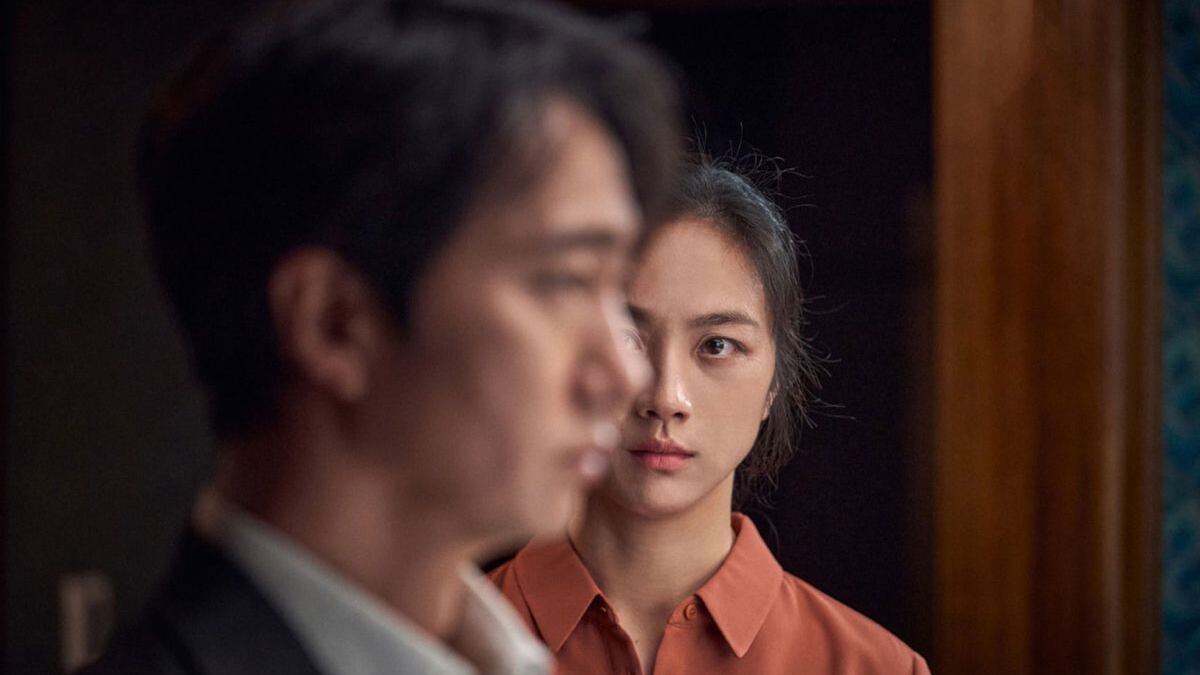DECISION TO LEAVE
****Director Park Chan-wook loves a curse. From revenge (Oldboy) to vampirism (Thirst) to abuse (The Handmaiden), the Korean master often treats character motivations as binding covenants of passion and perversion. So it is with Decision to Leave, for which he won Best Director at Cannes. When a Busan immigration officer falls to his death, his widow (Tang Wei of Lust, Caution fame) and an investigating detective (Park Hae-il) enter a classic noir two-step of suspicion and attraction (a trope deployed by everyone from Hitchcock to Eszterhas). But Park has plenty to add, always emphasizing character over casework: This investigation’s intensity fatalistically marks the participants. Certain elements recall Bong Joon-ho’s Memories of Murder, especially the casting of Park Hae-il, whose boyish beauty is pulverized by his character’s job here. But the film is mostly interested in the detective as an idea—an assembly of attractive, manipulatable qualities, from his dignified-cop mannerisms to extra storage pockets in his slacks. Rest assured, there are jaw-dropping foot chases and skirmishes, but Decision to Leave is mostly Park Chan-wook at deconstructive play. In the long lineage of cops and suspects improperly entwined, here’s a new cosmic joke about relationships: At last, a man who pays attention. NR. CHANCE SOLEM-PFEIFER. Cinema 21, Hollywood.
AMSTERDAM
**** In 1933, Maj. Gen. Smedley Butler testified to Congress about an attempted coup orchestrated by fascism-adoring industrialists who sought to overthrow President Franklin D. Roosevelt. While Butler’s account was dismissed by many, a special House committee confirmed parts of his story, which has been skillfully stitched into Amsterdam, a poignant and witty historical remix from director David O. Russell (American Hustle). Rather than start at the corrosive heart of what is now known as the Business Plot, Russell shows the conspiracy taking shape through the eyes of Burt (Christian Bale) and Harold (John David Washington), two World War I veterans falsely accused of murder. Valerie (Margot Robbie), a former nurse who saved their lives during the war, helps them enlist Maj. Gen. Dillenbeck (Robert De Niro, playing a Smedley Butler analog) to catch the culprit, but Russell is in no rush to solve a mystery. Leisurely and lovingly, he wraps us in the fabric of Burt, Harold and Valerie’s lives, dwelling on details that are both unnerving and beautiful, like the tea set that Valerie fashions from shrapnel. If Amsterdam believes anything, it’s that democracy is defined by the seemingly small things that make a human being an individual, absurd as they may be. That’s why the climax offers a rousing tribute to radical niceness and the gloriously silly spectacle of Burt singing, getting high, and teaming up with a British secret agent played by Austin Powers himself, Mike Myers. “You gotta fight to protect kindness,” Burt declares. He’s right, but he and Amsterdam are also fighting to protect something else: the liberating, life-giving power of ridiculousness. R. BENNETT CAMPBELL FERGUSON. Bagdad, Cinemagic, City Center, Clackamas, Eastport Plaza, Evergreen Parkway, Fox Tower, Laurelhurst, Living Room, Lloyd Center, Oak Grove, Regal Tigard, St. Johns Twin, Studio One.
SMILE
**** For horror-movie lovers, it’s rare to find a flick that can really get under your skin, but Smile will leave you looking over your shoulder to make sure no strangers are grinning in your direction. Written and directed by first-time feature filmmaker Parker Finn, the movie invites you to descend into madness alongside psychiatrist Dr. Rose Cotter (Sosie Bacon) as she attempts to outrun the evil smiling presence that wants her dead. It’s the kind of film best watched behind squinting or fully shut eyes with an audience that unleashes a symphony of screams as each new terror is revealed (in the silence before a scare, I heard an adult woman whisper to a friend beside her, “I’m going to pee my pants”). Seamlessly intertwining indie motifs into a studio production, Finn explores the horrors of mental illness, but unlike certain filmmakers, he doesn’t vilify those who suffer from it (I’m looking at you, M. Night Shyamalan). Eventually, the madness thickens and pulls you under, leaving you to question your own sanity by the time the credits roll. Smile is uniquely haunting and downright disturbing—and I can’t wait to watch it again. R. ALEX BARR. Bridgeport, City Center, Clackamas, Eastport Plaza, Evergreen Parkway, Fox Tower, Laurelhurst, Lloyd Center, Mill Plain 8, Oak Grove, Pioneer Place, Progress Ridge, Studio One, Tigard, Vancouver Plaza.
THE BANSHEES OF INISHERIN
** Colm (Brendan Gleeson) has decided he doesn’t want to be friends with Pádraic (Colin Farrell). “I just don’t like you anymore,” Colm announces, even though it’s more complicated than that. Colm, a gruff fiddler who wants to spend less time chatting and more time “thinking and composing,” thinks that Pádraic is “dull” and “limited.” Still, there is something mysterious about his sudden rejection of his longtime friend—and like a dogged detective, Pádraic is determined to crack the case. Set in a village off the coast of Ireland in 1923 and directed by Martin McDonagh, The Banshees of Inisherin reaches for symbolic grandeur—the rift between Colm and Pádraic says as much about Ireland’s history of sectarian violence as it does about them. Emotionally and intellectually, it’s a far richer film than Three Billboards Outside Ebbing, Missouri (McDonagh’s last attempt to mine a small town for mythic ideas), but there’s something profoundly irritating about its high-minded pessimism. When Pádraic delivers a drunken yet rousing defense of kindness, Colm insists that “niceness doesn’t last”—a far cry from David O. Russell’s recent masterwork Amsterdam, which declared that niceness was worth fighting for whether it lasted or not. The Banshees of Inisherin is grimly funny and genuinely tragic, but it doesn’t fight for anything—it just wallows in Pádraic’s misery, which is compounded by cameos by severed human fingers and the gratuitous death of an adorable donkey. For all his ambition, McDonagh fails to understand one of cinema’s defining truths: that bleakness doesn’t automatically equal greatness. R. BENNETT CAMPBELL FERGUSON. Cinema 21, Hollywood.

